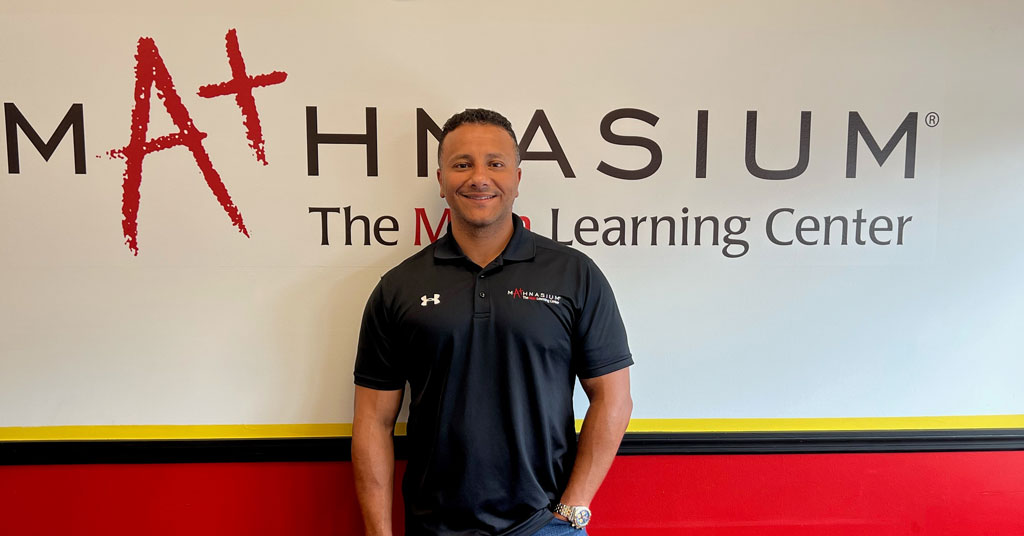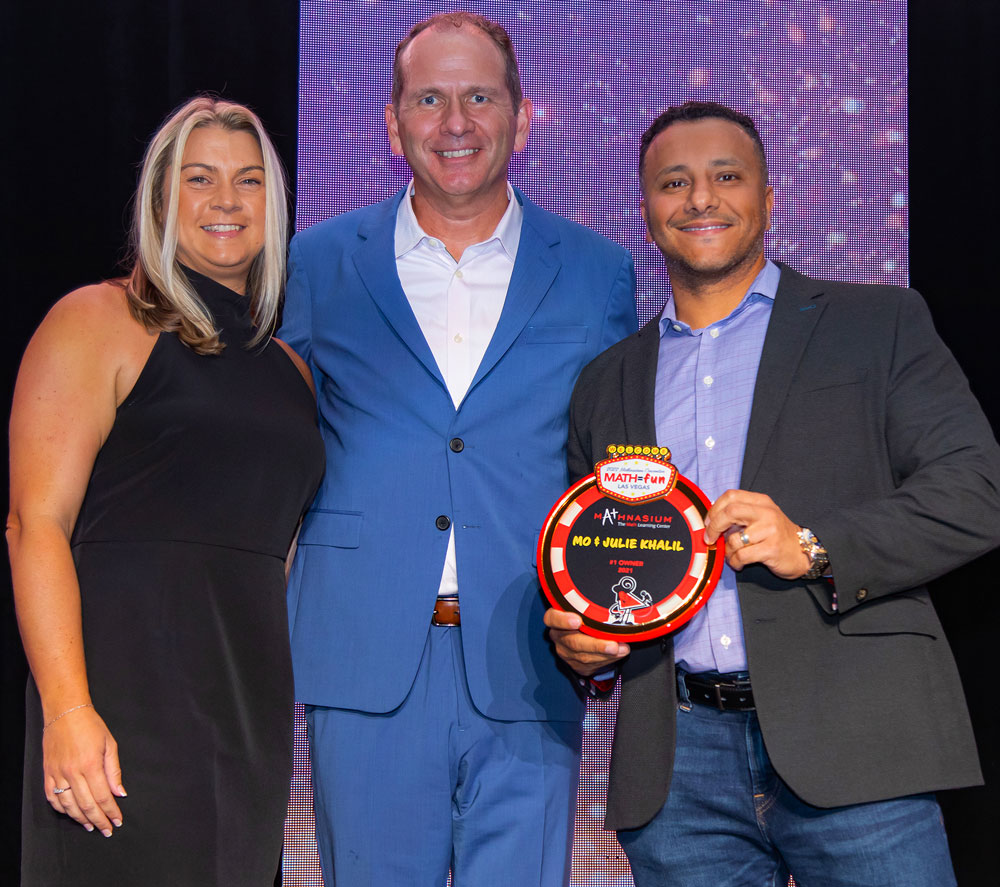
This is part 1 of a Q&A profile of a multi-unit service franchisee. Part 2 will appear in the next edition of this newsletter. The full profile will appear in the Q4 issue of Multi-Unit Franchisee magazine in November.
Name: Mo Khalil
Title: Executive director and multi-unit owner
Company: Khalil Ventures
Units: 39
Age: 44
Family: Married to Julie and raising two boys, Alexander and Aidan
Years in franchising: 20
Years in current position: 12
Mo Khalil has experienced an American dream success story that almost wasn’t.
Khalil emigrated from Egypt to the U.S. when he was just 11 years old. He says learning English was challenging and assimilating in New York City’s Bronx county was not easy. At one point in his teens he even found himself homeless.
Today, Khalil is executive director of Khalil Ventures, a company he founded in 2011 that now operates 39 Mathnasium locations in Florida, Texas, and New Jersey.
“I always knew growing up that I wanted to have my own business,” says the 44-year-old Khalil. He got his first taste of business managing Pizza Hut and Rite Aid pharmacy locations while attending college. After college he worked for Ricoh and Canon Business Solutions in sales and management roles, adding skills to his business management toolbox. He entered the franchising world by operating a number of Wireless Zone stores before signing on with Mathnasium.
Khalil says he always loved math and teaching, which helped make the franchise a perfect fit. “My wife and I wanted to help children and Mathnasium gives us that chance,” he says. The brand’s established curriculum and teaching methods, combined with its proven business model, have helped Khalil build a business with more than $15 million in annual revenue.
Khalil and his organization have been recognized as Mathnasium’s Top Performing Franchisee for three years in a row. He’s also been recognized by the brand for Best Turnaround of a Resale and Top Multi-Unit by AUV.
Khalil says he’s looking to expand to 65 centers during the next 5 years and would like to reach 80 locations in the next decade. He’s also decided he wants to own the real estate where his centers are located. He says 25% is his current goal.
“To supplement the business, we’re striving to own the real estate side. Outside of that, we love what we do, it’s a satisfying business, and we’re making a real impact in communities and changing lives through math.”

PERSONAL
First job: I was a store manager at Pizza Hut, which was a franchisee-owned location.
Formative influences/events: I emigrated from Egypt and moved to The Bronx when I was 11 years old. I struggled to learn English and assimilate in New York.
Key accomplishments: Being a father, husband, and graduating college. Being a family man is my top priority.
Biggest current challenge: Living as a good example to my children and being a good father.
Next big goal: To expand to 50 math centers.
First turning point in your career: I learned my professional sales and marketing skills while working for Canon Business Solutions.
Best business decision: Choosing to invest in Mathnasium.
Hardest lesson learned: To not expand into too many markets without having a reliable cluster of locations in the area for ease of management. It’s challenging to manage one from afar versus establishing a cluster of centers as added support.
Work week: I break up my day by working from the office and home from 9 a.m. to 3 p.m., then spend time with the family and finish up work from 8 to 10 p.m.
Exercise/workout: Every day, five days a week.
Best advice you ever got: Think of your legacy early on and how you want people to remember you. I think of what people will think of me, which has helped me be a better father, husband, and businessman. My core values are much more focused, living with that mantra in mind.
What’s your passion in business? I enjoy the sales, marketing, and overall growth aspect of franchising. This involves location analysis, demographic analysis, and starting up locations.
How do you balance life and work? I try to split up the day. During the day it’s work, and family time is when the boys are home from school until they go to bed. I do make the common mistake of working from my phone a lot, which is something I am working on.
Guilty pleasure: Multitasking and working from my phone.
Favorite book: Remarkable! Maximizing Results Through Value Creation by Randy Ross and David Salyers.
Favorite movie: “Gladiator.”
What do most people not know about you? English is my second language. At one point in my late teens I was homeless.
Pet peeve: People who are unorganized and not passionate to succeed
What did you want to be when you grew up? Business person.
Last vacation: Dominican Republic.
Person I’d most like to have lunch with: Warren Buffett, self-made billionaire. A humble leader who still takes time to help others achieve success.
MANAGEMENT
Business philosophy: Find great people, train great people, and retain great people.
Management method or style: This has changed over the years. In the beginning I was very hands-on and did little to no delegation. Now I am more of a mentor who can delegate properly. By doing so, I empower my team to own different aspects of the business.
Greatest challenge: Like every industry, finding reliable people who are inspired to build a sustainable infrastructure for future growth.
How do others describe you? Intense.
One thing I’m looking to do better: Travel more for business. I don’t do it as much as I once did.
How I give my team room to innovate and experiment: I ask a lot of Socratic questions to provoke thoughtful conversation. It helps keep the ideas flowing and allows the team to make their own decisions. I share my opinion and ideas, but ultimately, they decide what is best. This creates ownership, responsibility, and accountability to their decisions.
How close are you to operations? Not as close anymore, but once I begin to travel again and visit centers, that will change. I focus on the growth of the company, while my CEO, Edwin Farner, owns the operational side.
What is the most important thing you rely on from your franchisor? The education department, including the proprietary curriculum.
What I need from vendors: Reliability, customer support, and continued focus on efficiency.
Have you changed your marketing strategy in response to the economy? How? Not really, we’ve always been focused on creating value with our program, and what we offer communities will always be of value, even if the economy fluctuates. Families and students will always need math help, so we try not to panic when the economy is in question.
How is social media affecting your business? It’s becoming more involved, so we are trying to incorporate more day-to-day updates at every location. It is a huge challenge to encourage 39 centers to make sure they are posting and sharing constant updates with their local communities.
How do you hire and fire? We do group interviews and have candidates interviewed by 3 to 4 different people. While we provide plenty of support, assistance, and training to get people comfortable in their position, if they’re not taking responsibility for their performance and ownership, then we part ways. If someone doesn’t want to do well, they won’t do well, and we won’t do their job for them.
How do you train and retain? We have a training department. Lauren Love is our director of training. She’s been with us for 12 years and does an incredible job with our staff. She’s created a detailed and extensive training program to equip all of our hires. We also rely heavily on our eight professional area managers, who each have multi-unit management experience. They maintain the field training during center visits, mentoring, observations, and follow-ups
How do you deal with problem employees? After we’ve had multiple discussions and feel we have exhausted our support resources, then we reevaluate if the individual aligns and reflects our core values. Our core values are centered on family, health, passion, respect, connection, and compassion. If they don’t fit or care about our core values, then we part ways.
Fastest way into my doghouse: People who do not accept responsibility or choose to deflect on others.
Next time: How Covid has affected his business, and Bottom Line.